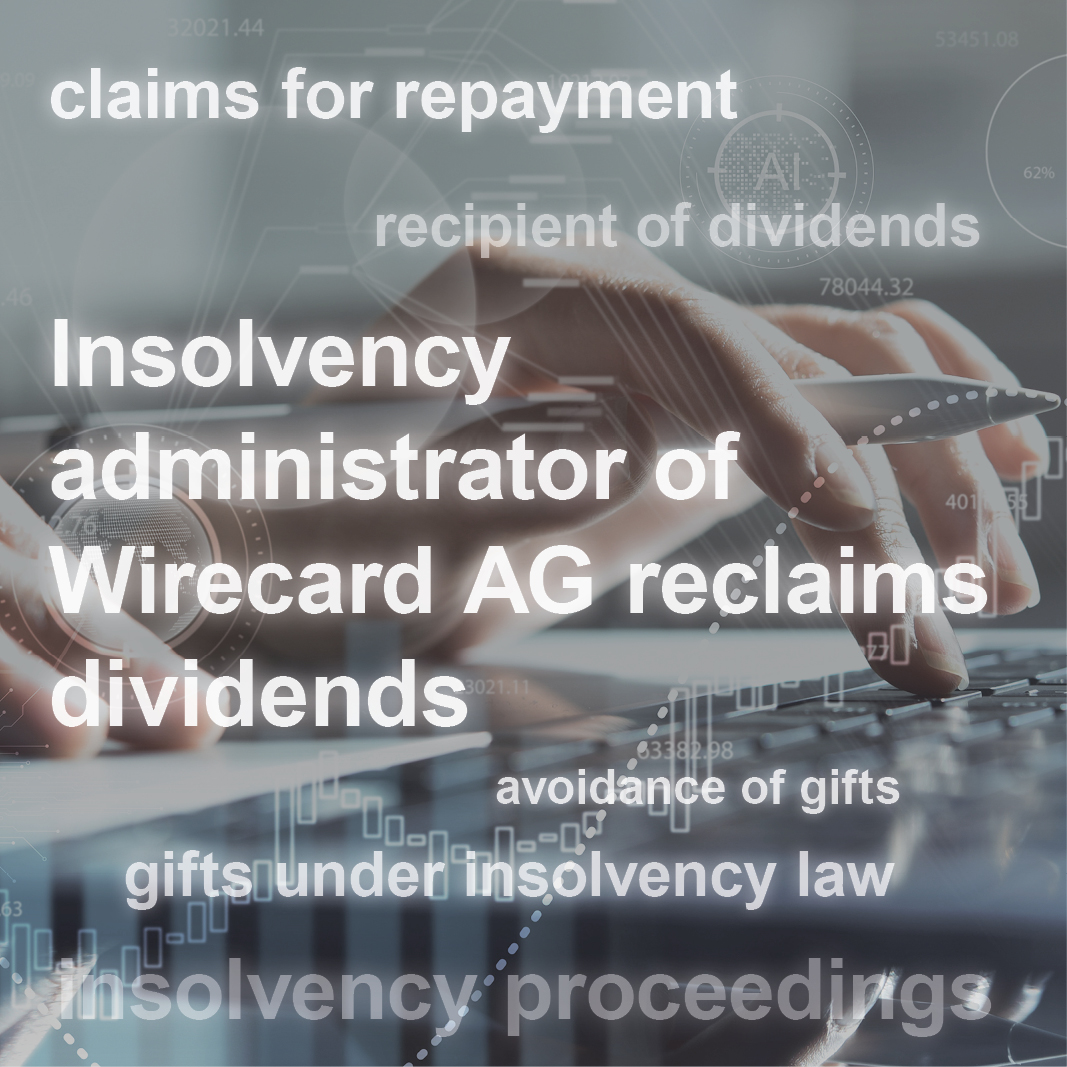17.11.2023
Insolvency administrator of Wirecard AG reclaims dividends

Following massive losses from share transactions, fund companies are now additionally expected to pay back the dividends distributed.
By final judgment, the Munich I Higher Regional Court has declared the 2017 and 2018 annual financial statements of Wirecard AG null and void due to balance sheet manipulation. This opens up various possibilities for holding liable the persons whose negligence enabled and promoted the fraudulent business model of Wirecard AG. In spite of this fact, in the opinion of Wirecard AG’s insolvency administrator, Dr Michael Jaffé, the investors should pay for most of the damage. The administrator has now started to reclaim dividend payments from the years 2017 and 2018, the main focus being on institutional investors – including those from abroad – whose funds held comparatively large numbers of the shares on the respective dividend record dates.
The reclaim is based on the avoidance of gifts under insolvency law. There is little doubt in this respect that the requirements for avoidance are generally met. There is, however, considerable doubt as to whether investment management companies can be the debtors of such claims for repayment. Furthermore, chances are good – in particular for institutional investors – that the enrichment no longer exists, in particular in light of the fact that the administrator reclaims from the investors not only the dividends paid out but also taxes already paid.
Overall, the question of whether such a claim for repayment can be enforced depends on various value issues that have not yet been subject to judicial review. Besides, the general confidence of investors in the integrity and stability of the capital market, which is intended to play a greater role in public finance in future, is also at stake. Finally, there emerges a conflict of values in a recent, and controversial, decision by the German Federal Court of Justice, according to which the good faith of a recipient of dividends is not an obstacle to avoidance under insolvency law even though Section 62 (1), second sentence, of the German Stock Corporation Act expressly provides otherwise in a corporate law context.
There is reason to question the assertion of claims against the investment management companies or the respective funds, under the law governing the avoidance of debtor transactions and also under capital markets and corporate law. The choice of the correct party opposing avoidance most likely depends on who is to be considered the intended recipient of the dividends paid. Based on the principles of both capital markets and corporate law, the investment management company is not to be regarded as a shareholder and, therefore, is not the recipient of the dividends paid. Furthermore, it must be taken into account that regardless of which of the possible forms of organisation provided for in the German Capital Investment Code is chosen, the respective fund company has no beneficial ownership of the managed investment scheme and is subject to a strict separation of assets. In this respect, there are good grounds to question whether an asset was even obtained for the purposes of avoidance law (not for the purposes of enrichment law). Finally, the repayment of dividends from the respective investment schemes of the funds raises concerns in particular with regard to the protection of investors under capital markets law. Such repayments could – at least in the case of public funds – result in completely uninvolved investors being held liable, which additionally gives rise to constitutional concerns (Article 14 (1) of the German Basic (Constitutional) Law).
Furthermore, those against whom the insolvency administrator asserts a claim for repayment might be able to plead loss of enrichment under Section 143 (2) of the German Insolvency Code. This defence is likely to be successful if the dividends paid are no longer part of the fund’s assets or the amount disbursed has been otherwise reduced. Distributions since made to the investors of the fund and tax payments are particularly relevant in this respect. Here, too, the insolvency administrator is entering uncharted legal territory, as there is no case law dealing with similar cases.
Against this background, institutional investors might find it worth their while to oppose the insolvency administrator’s claims, not least because the administrator has only limited access to information. This applies both to the number of Wirecard shareholders, and their identity and holdings, and to the amount of the dividends paid out; consequently, the notices of avoidance are partly based on incorrect information about the numbers of shares and their owners. Whether the administrator will be able to assert a right to information against the investment management companies remains to be seen. After all, the administrator is running out of time: the (alleged) claims might become time-barred already at the end of 2023.

Henning Brockhaus
Partner
Frankfurt a.M.
henning.brockhaus@luther-lawfirm.com
+49 69 27229 10602

Dr Boris Ober
Partner
Cologne
boris.ober@luther-lawfirm.com
+49 221 9937 18764